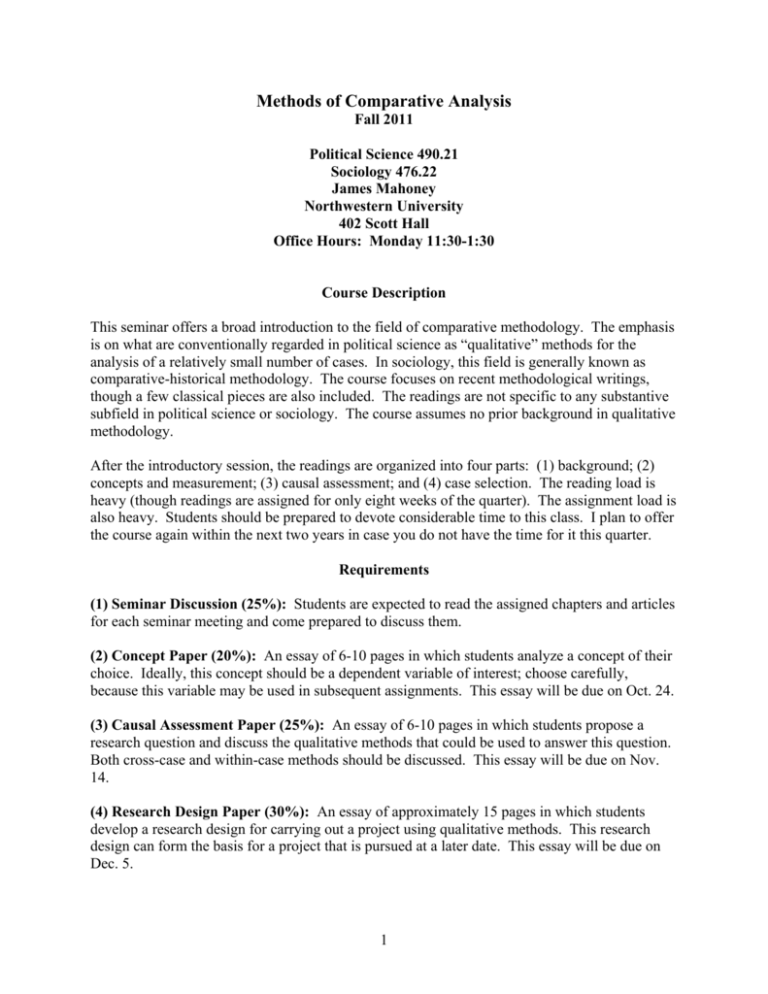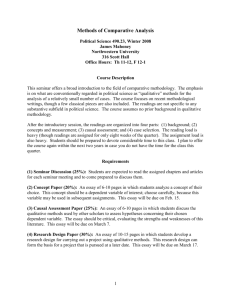Methods of Comparative Analysis
advertisement

Methods of Comparative Analysis Fall 2011 Political Science 490.21 Sociology 476.22 James Mahoney Northwestern University 402 Scott Hall Office Hours: Monday 11:30-1:30 Course Description This seminar offers a broad introduction to the field of comparative methodology. The emphasis is on what are conventionally regarded in political science as “qualitative” methods for the analysis of a relatively small number of cases. In sociology, this field is generally known as comparative-historical methodology. The course focuses on recent methodological writings, though a few classical pieces are also included. The readings are not specific to any substantive subfield in political science or sociology. The course assumes no prior background in qualitative methodology. After the introductory session, the readings are organized into four parts: (1) background; (2) concepts and measurement; (3) causal assessment; and (4) case selection. The reading load is heavy (though readings are assigned for only eight weeks of the quarter). The assignment load is also heavy. Students should be prepared to devote considerable time to this class. I plan to offer the course again within the next two years in case you do not have the time for it this quarter. Requirements (1) Seminar Discussion (25%): Students are expected to read the assigned chapters and articles for each seminar meeting and come prepared to discuss them. (2) Concept Paper (20%): An essay of 6-10 pages in which students analyze a concept of their choice. Ideally, this concept should be a dependent variable of interest; choose carefully, because this variable may be used in subsequent assignments. This essay will be due on Oct. 24. (3) Causal Assessment Paper (25%): An essay of 6-10 pages in which students propose a research question and discuss the qualitative methods that could be used to answer this question. Both cross-case and within-case methods should be discussed. This essay will be due on Nov. 14. (4) Research Design Paper (30%): An essay of approximately 15 pages in which students develop a research design for carrying out a project using qualitative methods. This research design can form the basis for a project that is pursued at a later date. This essay will be due on Dec. 5. 1 Books to Purchase Henry Brady and David Collier, eds., Rethinking Social Inquiry: Diverse Tools, Shared Standards, second ed. (Lanham: Rowman and Littlefield, 2010). Alexander L. George and Andrew Bennett, Case Studies and Theory Development in the Social Science (Cambridge, Mass: MIT Press, 2005). Gary Goertz, Social Science Concepts: A User’s Guide (Princeton: Princeton University Press, 2005). Gary King, Robert Keohane, and Sydney Verba, Designing Social Inquiry: Scientific Inference in Qualitative Research (Princeton: Princeton University Press, 1994). Charles C. Ragin, Redesigning Social Inquiry: Fuzzy Sets and Beyond (Chicago: University of Chicago Press, 2008). Course Outline 1. Introduction to the Course (Sept. 22) No reading assignments; overview of syllabus and resources for people interested in qualitative methods. Part I: Background 2. Starting with Substantive Examples (Sept. 29) Dreze, Jean, and Amartya Sen, “China and India,” in Dreze and Sen, Hunger and Public Action (New York: Oxford University Press, 1989), pp. 204-225. [Course Webpage] Tannenwald, Nina, “The Nuclear Taboo: The United States and the Normative Basis of Nuclear Non-Use,” International Organization 53:3 (Summer 1999), pp. 433-68. [Download] Kreuzer, Marcus, “Historical Knowledge and Qualitative Analysis: The Case of the Origins of Proportional Representation,” American Political Science Review 104 (2010), pp. 369-392. [Download] Wickham-Crowley, Timothy P. “A Qualitative Comparative Approach to Latin American Revolutions,” International Journal of Comparative Sociology 32 (1991), pp. 82-109. [Download] Mahoney, James, “Long-Run Development and the Legacy of Colonialism in Spanish America,” American Journal of Sociology 109:1 (2003), pp. 51-106. [Download] 2 3. Overview of the Field (Oct. 6) King, Gary, Robert O. Keohane, and Sidney Verba, “The Science in Social Science,” in King, Keohane, and Verba, Designing Social Inquiry: Scientific Inference in Qualitative Research (Princeton: Princeton University Press, 1994), pp. 3-34. [Book] Collier, David, “The Comparative Method,” in Ada W. Finifter, ed., Political Science: The State of the Discipline II (Washington, D.C.: American Political Science Association, 1993), pp. 105-19. [Download from David Collier’s webpage: http://www.polisci.berkeley.edu/Faculty/bio/permanent/Collier,D/] Mahoney, James, “After KKV: The New Methodology of Qualitative Research,” World Politics 62:1 (January 2010), pp. 120-247. [Download] Brady, Henry, David Collier, and Jason Seawright, “Introduction to the Second Edition: A Sea Change in Political Methodology” and “Refocusing the Discussion of Methodology,” in Henry Brady and David Collier, eds., Rethinking Social Inquiry: Diverse Tools, Shared Standards, second ed. (Lanham: Rowman and Littlefield, 2010), pp. 1-10 and 15-32. [Book] George, Alexander L., and Andrew Bennett, “Case Studies and Theory Development,” in George and Bennett, Case Studies and Theory Development in the Social Science (Cambridge, Mass: MIT Press, 2005), pp. 3-36. [Book] Part II: Conceptualization and Measurement 4. Approaches to Concepts and Measurement (Oct. 13) Gerring, John, “What Makes a Concept Good?: A Criterial Framework for Understanding Concept Formation in the Social Sciences,” Polity 31:3 (Spring 1999), pp. 357-393. [Download] Goertz, Gary, Social Science Concepts: A User’s Guide (Princeton: Princeton University Press, 2005), pp. 1-94. [Book] Adcock, Robert N., and David Collier, “Measurement Validity: A Shared Standard for Qualitative and Quantitative Research,” American Political Science Review 95:3 (September 2001), pp. 529-46. [Download] 5. Illustrations from Work on Democracy (Oct. 20) Munck, Gerardo L., and Jay Verkuilen, “Measuring Democracy: Evaluating Alternative Indices,” Comparative Political Studies 35:1 (February 2002), pp. 5-34. [Download] 3 Collier, David, and Steven Levitsky, “Democracy with Adjectives: Conceptual Innovation in Comparative Research,” World Politics 49:3 (April 1997), pp. 430-51. [Download] Bowman, Kirk, Fabrice Lehoucq, and James Mahoney, “Measuring Political Democracy: Case Expertise, Data Adequacy, and Central America,” Comparative Political Studies 38:8 (October 2005), pp. 939-970. [Download] Paxton, Pamela, “Women’s Suffrage in the Measurement of Democracy: Problems of Operationalization,” Studies in Comparative International Development 35:3 (September 2000), pp. 92-111. [Download] Part III: Causal Assessment 6. Causality (Oct. 27) King, Gary, Robert O. Keohane, and Sidney Verba, “Causality and Causal Inference,” in King, Keohane, and Verba, Designing Social Inquiry: Scientific Inference in Qualitative Research (Princeton: Princeton University Press, 1994), pp. 75-114. [Book] Goertz, Gary, and Harvey Starr, “Introduction: Necessary Condition Logics, Research Design, and Theory,” in Gary Goertz and Harvey Starr, eds., Necessary Conditions: Theory, Methodology, and Applications (Lanham: Roman and Littlefield, 2003), pp. 1-24. [Course Webpage] Mahoney, James, “Toward a Unified Theory of Causality,” Comparative Political Studies 41:4/5 (April/May 2008): 412-436. [Download] Collier, David, Henry E. Brady, and Jason Seawright, “Sources of Leverage in Causal Inference: Toward an Alternative View of Methodology,” in Henry Brady and David Collier, eds., Rethinking Social Inquiry: Diverse Tools, Shared Standards, second ed. (Lanham: Rowman and Littlefield, 2010), pp. 161-199. [Book] 7. Cross-Case Analysis (Nov. 3) Elman, Colin. “Explanatory Typologies in Qualitative Studies of International Politics,” International Organization 59 (2005), pp. 293-326. [Download] Mahoney, James, “Strategies of Causal Inference in Small-N Analysis,” Sociological Methods and Research 28: 4 (May 2000), pp. 387-424. [Download] Read pp. 387-409 only. Ragin, Charles C., Redesigning Social Inquiry: Fuzzy Sets and Beyond (Chicago: University of Chicago Press, 2008), pp. 13-68. [Book] 4 George, Alexander L., and Andrew Bennett, “Comparative Methods” and “The Congruence Method,” in George and Bennett, Case Studies and Theory Development in the Social Science (Cambridge, Mass: MIT Press, 2005), pp. 151-204. [Book] 8. Within-Case Analysis (Nov. 10) Collier, David. “Understanding Process Tracing,” PS: Political Science and Politics 44:4 (October 2011). [Download] Brady, Henry E., “Data-Set Observations versus Causal Process Observations: The 2000 U.S. Presidential Election,” in Henry Brady and David Collier, eds., Rethinking Social Inquiry: Diverse Tools, Shared Standards, second ed. (Lanham: Rowman and Littlefield, 2010), pp. 237-242. [Book] Mahoney, James, “The Logic of Process Tracing Tests in the Social Sciences,” Manuscript, 2011. [Course Webpage] Bennett, Andrew, “Process Tracing: A Bayesian Perspective,” in Janet M. Box-Steffensmeier, Henry E. Brady, and David Collier, eds., The Oxford Handbook of Political Methodology (Oxford: Oxford University Press, 2008), pp. 702-21. [Course Webpage] Rueschemeyer, Dietrich, and John D. Stephens, “Comparing Historical Sequences – A Powerful Tool for Causal Analysis,” Comparative Social Research 17 (1997), pp. 55-72. [Course Webpage] Part IV: Case Selection 9. Case Selection (Nov. 17) Lieberman, Evan. “Nested Analysis as a Mixed-Method Strategy for Comparative Research,” American Political Science Review 93: 3 (August 2005), pp. 435-52. [Download] Rohlfing, Ingo, “What You See and What You Get: Pitfalls and Principles of Nested Analysis in Comparative Research,” Comparative Political Studies 41:11 (2008), pp. 1492-1514. [Download] Collier, David, and James Mahoney, “Insights and Pitfalls: Selection Bias in Qualitative Research,” World Politics 49 (October 1996), pp. 56-91. [Download] Gerring, John, and Jason Seawright, “Case Selection Techniques in Case Study Research: A Menu of Qualitative and Quantitative Options,” Political Research Quarterly 61:2 (June 2008), pp. 294-308. [Download] 5 Goertz, Gary, and James Mahoney, “Case Selection and Hypothesis Testing,” in Goertz and Mahoney, A Tale of Two Cultures: Contrasting Quantitative and Qualitative Research Paradigms, book manuscript. [Course Webpage] 10. Optional Class: Two Cultures of Research (Dec. 1) Goertz, Gary, and James Mahoney, A Tale of Two Cultures: Contrasting Quantitative and Qualitative Research Paradigms, book manuscript. [Course Webpage] 6
